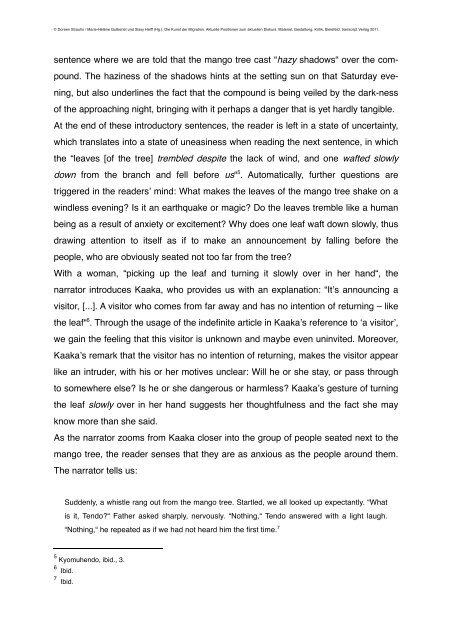Waiting – A Novel of Uganda at War - Migration & Media
Waiting – A Novel of Uganda at War - Migration & Media
Waiting – A Novel of Uganda at War - Migration & Media
You also want an ePaper? Increase the reach of your titles
YUMPU automatically turns print PDFs into web optimized ePapers that Google loves.
© Doreen Strauhs / Marie-Hélène Gutberlet und Sissy Helff (Hg.): Die Kunst der Migr<strong>at</strong>ion. Aktuelle Positionen zum aktuellen Diskurs. M<strong>at</strong>erial, Gestaltung, Kritik, Bielefeld: transcript Verlag 2011.<br />
sentence where we are told th<strong>at</strong> the mango tree cast “hazy shadows“ over the com-<br />
pound. The haziness <strong>of</strong> the shadows hints <strong>at</strong> the setting sun on th<strong>at</strong> S<strong>at</strong>urday eve-<br />
ning, but also underlines the fact th<strong>at</strong> the compound is being veiled by the dark-ness<br />
<strong>of</strong> the approaching night, bringing with it perhaps a danger th<strong>at</strong> is yet hardly tangible.<br />
At the end <strong>of</strong> these introductory sentences, the reader is left in a st<strong>at</strong>e <strong>of</strong> uncertainty,<br />
which transl<strong>at</strong>es into a st<strong>at</strong>e <strong>of</strong> uneasiness when reading the next sentence, in which<br />
the “leaves [<strong>of</strong> the tree] trembled despite the lack <strong>of</strong> wind, and one wafted slowly<br />
down from the branch and fell before us“ 5 . Autom<strong>at</strong>ically, further questions are<br />
triggered in the readers’ mind: Wh<strong>at</strong> makes the leaves <strong>of</strong> the mango tree shake on a<br />
windless evening? Is it an earthquake or magic? Do the leaves tremble like a human<br />
being as a result <strong>of</strong> anxiety or excitement? Why does one leaf waft down slowly, thus<br />
drawing <strong>at</strong>tention to itself as if to make an announcement by falling before the<br />
people, who are obviously se<strong>at</strong>ed not too far from the tree?<br />
With a woman, “picking up the leaf and turning it slowly over in her hand“, the<br />
narr<strong>at</strong>or introduces Kaaka, who provides us with an explan<strong>at</strong>ion: “It’s announcing a<br />
visitor, [...]. A visitor who comes from far away and has no intention <strong>of</strong> returning <strong>–</strong> like<br />
the leaf“ 6 . Through the usage <strong>of</strong> the indefinite article in Kaaka’s reference to ‘a visitor’,<br />
we gain the feeling th<strong>at</strong> this visitor is unknown and maybe even uninvited. Moreover,<br />
Kaaka’s remark th<strong>at</strong> the visitor has no intention <strong>of</strong> returning, makes the visitor appear<br />
like an intruder, with his or her motives unclear: Will he or she stay, or pass through<br />
to somewhere else? Is he or she dangerous or harmless? Kaaka’s gesture <strong>of</strong> turning<br />
the leaf slowly over in her hand suggests her thoughtfulness and the fact she may<br />
know more than she said.<br />
As the narr<strong>at</strong>or zooms from Kaaka closer into the group <strong>of</strong> people se<strong>at</strong>ed next to the<br />
mango tree, the reader senses th<strong>at</strong> they are as anxious as the people around them.<br />
The narr<strong>at</strong>or tells us:<br />
Suddenly, a whistle rang out from the mango tree. Startled, we all looked up expectantly. “Wh<strong>at</strong><br />
is it, Tendo?“ F<strong>at</strong>her asked sharply, nervously. “Nothing,“ Tendo answered with a light laugh.<br />
“Nothing,“ he repe<strong>at</strong>ed as if we had not heard him the first time. 7<br />
5 Kyomuhendo, ibid., 3.<br />
6 Ibid.<br />
7 Ibid.


